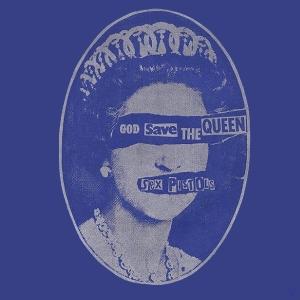The Royal Jubilee, The Sex Pistols and Me
This is the cover art of the Sex Pistols’ 1977 single “God Save the Queen,” designed by Jamie Reid. (Photo: Wikipedia)
There’s going to be a big party in Britain this weekend. It’s Queen Elizabeth’s Diamond Jubilee, marking her sixty years on the throne. There hasn’t been a jubilee party like this since 1977, the year of the Queen’s Silver Jubilee.
I was a teenager back then, studiously ignoring the royal hoopla. I knew that there were street parties across the UK, at which every child would be given a special commemorative mug. In my absence, my mother snagged my mug.
Back then, Britain was a land of ailing factories and industrial action. With the strikes came a three-day work week and blackouts. Unemployment was rising. It was grim.
I suppose that some of that was at the back of my teenage mind. At the front of it was punk rock. The “no future” nihilism of punk fit the times. But I was just as drawn to punk’s amateurish playfulness, and its cheek.
The Sex Pistols had all of those ingredients, and more. So when their single “God Save the Queen,” was released just before the Silver Jubilee, I was one of the thousands of adolescent Brits who flocked to buy it. Suddenly, someone was saying something about Britain that I could buy into. Johnny Rotten was our Holden Caulfield.
The lyrics to the song are extravagantly over the top (“God Save the Queen/The fascist regime/ They made you a moron/ Potential H-bomb”). My punk-loving friends and I understood that this was hyperbole as provocation: we were aware that we didn’t live in a fascist regime. So we were greatly amused that so many adults didn’t seem to get it. As we watched the politicians, the music establishment and the tabloids froth with outrage, we realized that they’d all been been had by four snarling, snotty-nosed brats with made-up names.
And yet, this song was also terrifying to both young and old, us and them: “When there’s no future/How can there be sin/We’re the flowers in the dustbin/We’re the poison in your human machine/We’re the future, your future.” Even today, it scares me.
Some record stores refused to stock “God Save the Queen,” or display its notorious cover.
The BBC refused to play it on the air,” calling it in “gross bad taste.” When the BBC announced its weekly singles chart, “God Save the Queen” was listed at Number 2, behind a Rod Stewart song. And so began the suspicion, unabated since, that the BBC had fixed the listings, so that an anti-monarchy screed wouldn’t be topping the charts during Jubilee week.
Thirty-five years later, in another Jubilee summer, there’s another attempt to make “God Save the Queen” the top-seller. The single has been re-released and there’s a Facebook effort, not endorsed by the band, to get people to buy the single so that it finally tops the charts.
Maybe that’s missing the point. “God Save the Queen” is a classic. But the history it made–the headlines, the outrage– were all very much set in the year 1977.
There’s more about Britain’s recent social history in our series Beyond Class. This story traces the British government’s attempts to create a classless society.
Our coverage reaches millions each week, but only a small fraction of listeners contribute to sustain our program. We still need 224 more people to donate $100 or $10/monthly to unlock our $67,000 match. Will you help us get there today?
